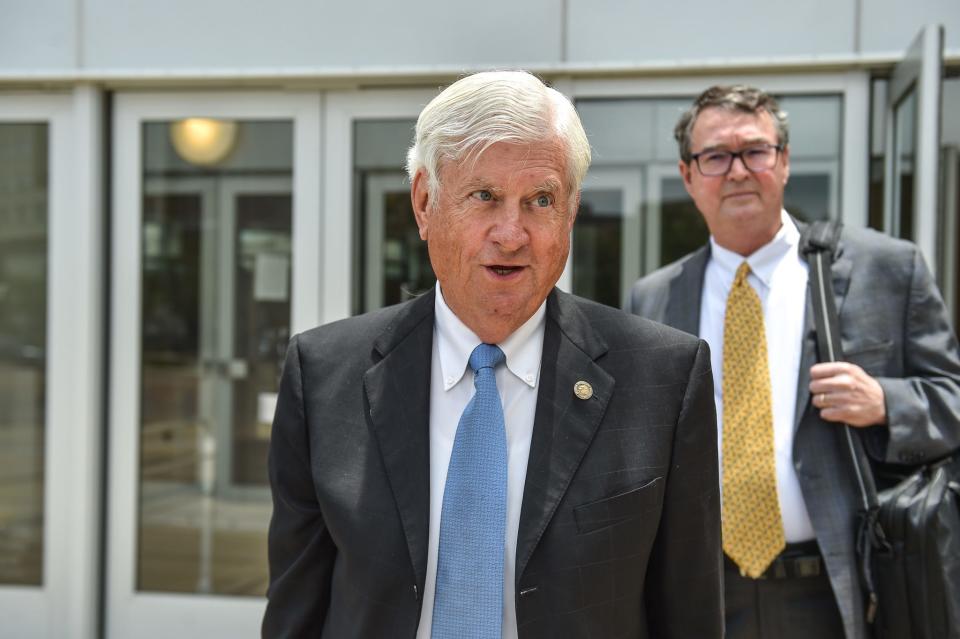HB 1020 hearing focuses again on whether chief justice can be a defendant. What's at stake
Attorneys spent nearly three hours Wednesday morning debating aspects of the controversial House Bill 1020 and another associated bill, both of which would become law July 1 if not for a restraining order associated with the case, but as the parties broke for lunch little progress had been made on the merits of the case.
Instead, the parties discussed the possibility of merging the case, brought by the NAACP, with another case and relitigating the inclusion of Mississippi Supreme Court Chief Justice Michael Randolph as a defendant.
Judge rules Chief Justice not defendant: Mississippi Supreme Court Chief Justice removed from federal House Bill 1020 challenge
Randolph had been granted judicial immunity by U.S. District Judge Henry Wingate earlier this month, but attorneys for the NAACP asked Wingate for clarification Thursday, and Mark Nelson, an attorney for Randolph, asked the judge to declare his earlier decision a final order. Nelson said he was shocked to see the plaintiffs motion for clarification, adding that it is really an attempt to challenge Wingate's earlier decision.
"This is nothing more than a rejection of your honor's ruling. I don't want to say that it's contemptuous, but it's getting close," Nelson said.
At one point, the chief justice stood behind the podium and addressed Wingate himself, to which the federal judge asked the state judge how long it had been since he'd addressed a court.
"It's been over 19 years," Randolph said. "Probably more than that since I've addressed you."

While Nelson has been adamant throughout the proceedings that his client cannot take a position on the constitutionality of HB 1020, Randolph did speak to the effectiveness of the judges he has appointed to the Hinds County Court in the past.
HB 1020 would see Randolph appoint more judges to the court, in addition to appointing a single judge to a new Capitol Complex Improvement District court. The existence of unelected state-appointed judges within Hinds County is at the core of the NAACP challenge.
Randolph told Wingate that the four appointments he has made to the Hinds County Court have yielded "marvelous results" in the face of rising crime and judicial backlogs, both of which have occurred throughout the state.
"The idea that I am directing something that is adverse to the citizens of this county is incorrect," Randolph told reporters outside of the Thad Cochran United States Courthouse in Jackson as attorneys left the building for lunch.
A separate challenge to HB 1020, based in state law, will soon appear before Randolph's court, with a hearing scheduled for July 6. A request for Randolph to recuse himself has been filed, and the chief justice said his legal team is working on its response.
Brenden Cline, a Washington, D.C., based attorney representing the plaintiffs, argued that Randolph not only can be a party to the lawsuit, but that he must be in order for a possible injunction to be properly executed. An injunction issued against Capitol Police Chief Bo Luckey or Department of Public Safety Commissioner Sean Tindell, for example, would not directly apply to Randolph, who has the sole power to appoint the judges, Cline argued.
Nelson argued that Randolph would have to follow any order Wingate issued on constitutionality, regardless of whether he was specifically named in the lawsuit.
At times, Randolph grew visibly frustrated that he was still involved in the case, directly questioning Cline's arguments and statements. Randolph indicated a belief that the plaintiffs were trying to drag the case out in order to impact his ability to preside over the state case, among other possible motivations.
"I shouldn't have to keep coming back, and the reason I say this is you entered an order," Randolph said to Wingate.
"I've never seen a circus like this one," Randolph later said. Wingate later gave the chief justice the opportunity to clarify what he meant by that statement, to which Randolph said it was solely targeted at the legal arguments made by the NAACP attorneys.
Wingate indicated that the next development in the case will come Friday, when the NAACP files an additional motion. Then, likely next week, he said he would issue a written order on Randolph and the attempts to consolidate the two cases. While a final decision on constitutionality is not expected for some time, a decision on whether the law will take effect or be put under an injunction will likely come sooner, though Wingate may hold additional oral arguments before making that decision.
This article originally appeared on Mississippi Clarion Ledger: HB 1020 Mississippi hearing focuses again on chief justice as defendant

